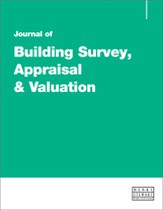Negligent valuation de-constructed : What is negligence at law? What are the practicalities in helping to avoid a claim?
Abstract
The implications of negligent valuation are imparted to surveyors from their student days and throughout their careers. Although without the emotive issues surrounding areas such as medicine, the financial impact with real estate transactions can ruin firms and individuals and, at the least, impact insurance premiums. Claims against valuers in negligence continue unabated, peaking when losses are exacerbated through falls in property values. Thus, a deeper understanding of how, practically, to fulfil the duty of care in valuation work is of relevance to all working in this area. The basis of negligence at law is set out with a brief review of the development of that law since the 19th century and a round-up of selected cases allowing them to provide lessons to practitioners on the practical means of avoiding a finding of negligent valuation. This paper also discusses the interaction between guidance notes, practice statements and other documents such as terms of engagement and the potential for deviation from professional standards in certain circumstances. It is evident from the law reports that although there has been judicial assertion that professional standards are not law and that non-compliance may not, of itself, constitute negligence, in practice it probably will.
The full article is available to subscribers to the journal.
Author's Biography
Carrie De Silva graduated in Law from the University of Leicester in the 1980s and spent several years working in corporate taxation, initially for Arthur Andersen and latterly in industry for an aggregates group, gaining tax qualifications. She has been in higher education since February 2000, specialising in law and taxation, and has an MA in Local History from Keele University. Carrie is Postgraduate Co-ordinator for the RICS accredited Rural Land and Estate Management programmes at Harper Adams University and runs a range of CPD seminars on legal and tax matters for the land and property sectors. Current research interests include a biography of the first women chartered surveyor (Irene Barclay) for the Oxford Dictionary of National Biography, and the history and practice of taxation in horse breeding, racing and other equine businesses. Publications available through Harper Adams and online: Equine Law, Equine Law (Northern Ireland edition), A Short History of Agricultural Education, Health and Safety Casebook, Negligent Valuation Casebook and First Women. Carrie is a Vice- President of the British Federation of Women Graduates and a non-executive director of BlueBox Partners Limited.
Citation
De Silva, Carrie (2018, December 1). Negligent valuation de-constructed : What is negligence at law? What are the practicalities in helping to avoid a claim?. In the Journal of Building Survey, Appraisal & Valuation, Volume 7, Issue 3. https://doi.org/10.69554/ETSN1058.Publications LLP
